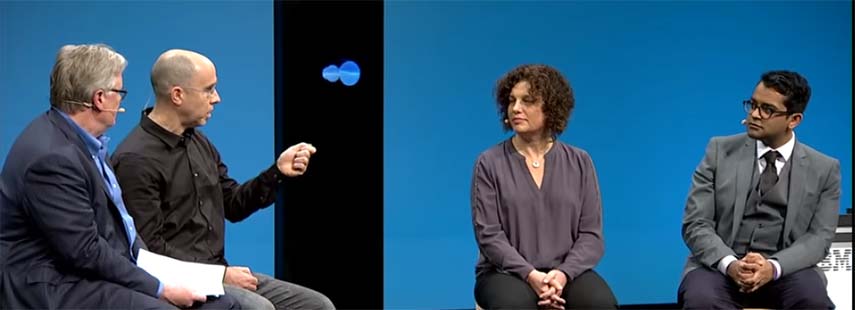Mark Davison is at IBM PartnerWorld in San Francisco – IBM’s AI platform Watson made history today when it took on a champion human debater in the first public debate of its kind on the statement: “We should subsidise pre-school.”
In the debate, moderated by four-time Emmy winner John Donvan who moderates debate series Intelligence Squared which is viewed by over 30-million US households, IBM’s AI system Project Debater took on debate champion and head of economic risk at AKE International, Harish Natarajan. Donvan set the scene when he announced: “Project Debater has a gender. SHE will be arguing for the resolution which means that Harish will be arguing against it. Welcome to the future.”
The debate included three rounds: a four minute introductory argument; a four minute rebuttal; and a two minute closing statement and conclusion. Each of the debaters was given 15 minutes to prepare their arguments.
Before the debate, the audience was asked to vote on their stance on the issue. They were then asked to vote again once both participants had concluded their arguments.
While 79% of the audience voted for the “pro” argument before the debate began, by its conclusion Natarajan had been able to persuade 17% to support his view and change their position on the topic. This meant he was declared the winner of the debate.
It was clear during the introductory argument that Project Debater had managed to sift through vast amounts of data to come up with a cohesive argument peppered with statistics, excerpts from science journals and quotes from politicians. But what did astound the audience was the sheer amount of data the AI system had managed to analyse in its 15 minute preparation. The project’s lead, Noam Slonim, put it into perspective: “It was a superb debate with different styles and highlighted the system’s capabilities.
“Project Debater has access to 10-billion sentences and had to quickly pinpoint pieces and facts that were relevant and supported its argument,” Slonim says. “It then has to put these together in a coherent manner which is very, very difficult for a machine.”
Even more impressive, however, was Project Debater’s rebuttal.
In his introductory argument, Natarajan showed his obvious prowess in debating and the reason he has been crowned a champion with subtle charm, nuances and even a bit of humour. Project Debater, which has the ability to recognise nuances in human speech and contextualise this, seemed to mimic Natarajan’s style in its rebuttal with hints of charm, pathos and even humour. “… I’m not suggesting a suitcase full of money which people help themselves to …” was one rebuttal of Natarajan’s notion that families would simply spend the money saved by subsidies on something less important. She also pointed out the responsibility of society towards the “weak and the vulnerable”, as well as defining welfare as “offering a hand to someone who fell.”
Natarajan, the human, may have won today’s historic debate, but there were no losers. The insight and experience that IBM has gained from the event is undoubtedly invaluable and will herald the next steps in the fast-paced evolution in AI.
Dario Gil, director of IBM Research, says that the complexity of language is one of AI’s greatest challenges. “There is great potential for AI that understands [language],” Gil says. “This will make AI more transparent which will make it more trusted. And the more trusted AI is, the more we can rely on it making decisions.”
Today saw a memorable event that may go down in history as the first step in that direction.
Pictured are moderator John Donvan, IBM researcher Noam Slonin, Project Debater manager Ranit Aharonov and debate champion Harish Natarajan

